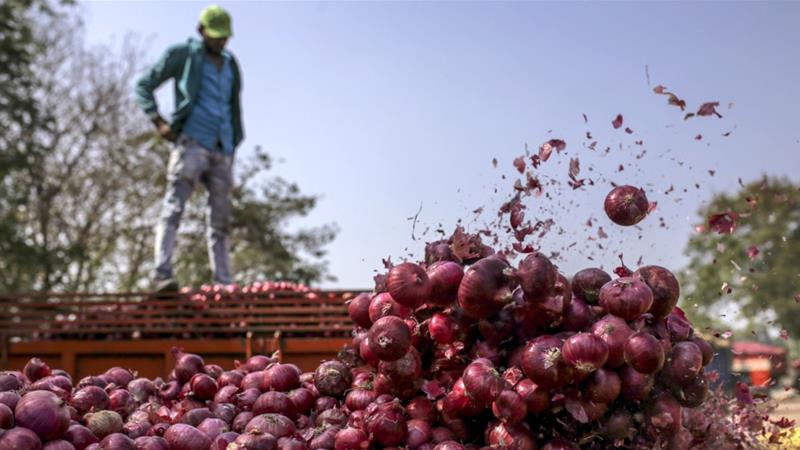India's annual retail inflation has accelerated to its highest level in more than five years, boosted by surging food and oil prices, increasing the likelihood of an extended pause in the central bank's interest rate cuts.
The pick-up in inflation to 7.35 percent in December adds to the challenges faced by Prime Minister Narendra Modi who is trying to revive slowing economic growth.
Retail food prices, which make up nearly half of the India's inflation basket, increased 14.12 percent in December from a year earlier, against 10.01 percent in November. Some vegetable prices, including prices of onions that are a staple in Indian cooking, have increased more than four-fold since June.
Volatile crude oil prices amid tensions between the United States and Iran are likely to add to price pressures in India, the world's third-biggest oil importer, analysts say.
"If oil and vegetable prices continue to remain high then inflation will hover near 6 percent," said Rahul Gupta, head of research for currency at Emkay Global Financial Services.
Oil briefly rose above $70 a barrel this month for the first time since September, and while they have since eased, prices remain elevated compared with last year.
The inflation rate was above the 5.54 percent posted in November and higher than the 6.20 percent forecast in a Reuters poll of economists, remaining above the Reserve Bank of India's (RBI) medium-target of 4 percent for the third-straight month, the data released by the Ministry of Statistics on Monday showed.
Retail inflation touched 7.39 percent in July 2014, according to Refinitiv data.
The RBI kept its policy interest rate on hold last month, after cutting it by 135 basis points since February 2019, citing inflationary pressures.
Growth is forecast by the government to grow at an 11-year low of 5 percent in 2019/20 fiscal year ending in March.
Economists say that rising headline and food inflation would soon feed into core inflation - stripping out food and fuel prices - which has remained much lower.
Five economists polled by Reuters after the release of inflation data estimated core inflation in the range of 3.7 percent - 4.2 percent in December compared with 3.4 percent - 3.6 percent in the previous month. The government does not publish core inflation figures.
"The RBI's concerns over second-round effects from food inflation and the recent rise in inflation expectations mean the easing cycle has ended," said Darren Aw, Asia economist at Capital Economics, Singapore.
He said he expected the RBI to hold interest rates when it meets for its next policy review from February 4 to 6.
Finance Minister Nirmala Sitharaman will present the annual budget for 2020/21 on February 1, and is widely expected to increase spending on infrastructure and cut taxes, which some economists fear could further stoke inflation.
"Clearly the room for monetary easing in the first half of calendar 2020 remains minimal despite growth continuing to remain below potential," said Upasna Bhardwaj, senior economist, Kotak Mahindra Bank, Mumbai.
SOURCE: News agencies



